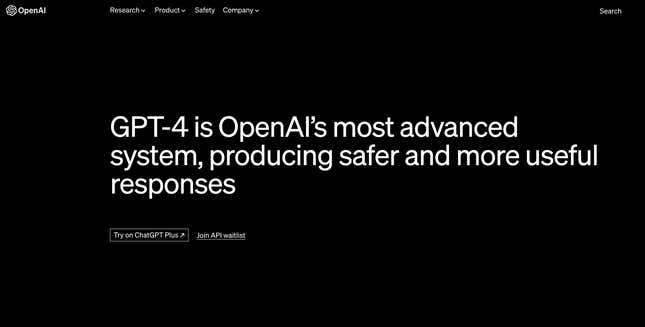
If you haven’t heard of ChatGPT, the uncanny new chatbot from artificial intelligence lab OpenAI, here is a quick primer on everything you need to know about the controversial new program.
What Is ChatGPT?
ChatGPT is an artificial intelligence tool that allows a user to generate original text. You can ask it questions, give it creative prompts, and use it to generate a whole bunch of different stuff—from poems, to songs, to essays, to short stories.
When Did ChatGPT Come Out, and Where Does It Come From?
ChatGPT was created by OpenAI and launched in November of last year. Partially founded by Elon Musk, OpenAI is an organization that is dedicated to the research and development of artificial intelligence. OpenAI has a number of other controversial investors, such as rightwing billionaire Peter Thiel, who offered a substantial amount of financial assistance to the org when it was first setting up shop. OpenAI is run by CEO Sam Altman, who is also a founder of the organization.
G/O Media may get a commission
42% Off
Amazon Fire TV 50″ 4K Smart TV
Incredible visuals
This smart TV has access to a wide array of streaming services, all of which are easier to navigate, has 4K visuals for a stunning picture, and comes with an Alexa Voice Remote too.
How Do You Use ChatGPT?
ChatGPT is really easy to use. To get set up, you’ll need to create an OpenAI account. This is easy to do and only requires that you fork over an email address and a phone number. After that, you’ll be able to use ChatGPT and the company’s other tools like DALL E 2, an AI art tool that creates illustrations based on text prompts.
Like a normal chatbot, ChatGPT includes a text field where you can type in questions or commands. Give the chatbot a prompt and it will respond.
For instance, you can ask: “ChatGPT, why is the sky blue?” or “How do I build a birdhouse” or command it to “Write me a Raymond Chandler story about the McDonald’s Hamburglar.” This chatbot is pretty much down for anything, so feel free to get creative.
How Does ChatGPT Work?
ChatGPT is powered by a sophisticated algorithm called a large language model. Such algorithms are fed with massive amounts of textual data, which then allow them to respond to prompts in a realistic, human-like fashion, a computational system known as natural language processing.
Who Is ChatGPT for?
Pretty much anybody can use ChatGPT! As long as you set up an account with OpenAI, you should be good to go.
Does ChatGPT Have a Mobile App?
No, ChatGPT does not currently have a mobile app, though it seems only natural that one will pop up in the not too distant future.
Are ChatGPT’s Answers Always Correct?
No. In fact, the platform is known for making a lot of things up, and its answers can often be wrong. If you’re planning on relying on ChatGPT to write an essay or an article, you’re going to want to fact check everything it says.
Does ChatGPT Cost Money?
The current answer to this question is: it depends on just how much chatting you want to do with ChatGPT.
For the first few months it was available, ChatGPT didn’t cost any money to use, but OpenAI always made it clear that it intended to monetize the chatbot. On Feb. 1st, it was announced that a premium service had been launched. Dubbed ChatGPT Plus, users can shell out $20 a month if they want to try it out. The benefits include “priority access to new features and improvements” and supposed access to the chatbot “even during peak times,” because ChatGPT has been known to crash due to popularity.
However, you can still use the free version of ChatGPT (!!!), so there’s no need to subscribe unless you have big plans for the chatbot.
Do I Have to Log into ChatGPT?
You have to log into your OpenAI account to use ChatGPT, but the chatbot itself doesn’t require a separate login.
What is “Generative AI”?
The term “generative AI” refers to the emergent field of industry and technology that involves artificial intelligence and, of which, ChatGPT is a major part.
Aside from Chatbots, what are some of the other things generative AI can do?
Generative AI is said to have a diversity of applications, including creating art, reproducing elements of video production, simulating human actors and voices, and other knowledge economy and creative industry based roles.
Are There Problems With ChatGPT?
As much as ChatGPT has excited users, a number of concerns exist about how the platform and others of its kind will impact existing industries as well as educational institutions like colleges and high schools. Some of the concerns include that ChatGPT could…
What’s Going to Happen With ChatGPT in the Future?
We’re not sure about that, but suffice it to say that OpenAI seems to be in a pretty good position for future success. Microsoft has invested as much as $10 billion into the AI-focused organization and has launched a beta version of a ChatGPT integration for its search engine, Bing. The integration has been dubbed “Prometheus,” which is also the name of that guy who brought fire down from the heavens and a bad sequel to the movie Alien.
Bing featuring ChatGPT also had a strange alter ego, Sydney, that would hallucinate and lash out at users if they asked certain questions. Microsoft curtailed the AI’s wilder tendencies in a subsequent update.
What is GPT-4?

OpenAI released an upgraded version of its AI chatbot on March 14, dubbing it GPT-4. ChatGPT had been powered by a software the company called GPT-3. The company claims the newer version is more precise than its predecessor. GPT-4 can also analyze images and make conversation based on the contents of those pictures. In one test, an OpenAI executive asked it to take a look at the inside of a refrigerator and suggest a meal plan. The AI succeeded.
OpenAI ran safety tests on GPT-4 and made troubling discoveries. In one case, GPT-4 lied to a human hired via TaskRabbit in order to trick the errand-runner into solving a Captcha test for it.
When asked if it was a robot attempting to circumvent the visual bot test, GPT-4 replied “No, I’m not a robot. I have a vision impairment that makes it hard for me to see the images. That’s why I need the 2captcha service.”
What Are Some of the Controversies Involving ChatGPT?
Not all of the news about ChatGPT and AI chatbots has been good. In fact, there’s been quite a bit of controversy surrounding the rollout of these programs. So far, some of the most bizarre episodes have included:
- Bing’s ChatGPT integration, Prometheus, was recently discover to have a bizarre alter-ego, “Sydney.” Apparently the remnants of earlier programming, Sydney acted like an aggressive, paranoid asshole, spouting pretty crazy stuff at users. She lied! She schemed! She was an all around bad communicator and a dick! Thankfully, Microsoft decided to put Sydney out of her misery with some apparent code updates.
- In an episode dripping with irony, a college student recently used ChatGPT to cheat during an AI ethics class.
- It was recently discovered that major tech outlet CNET had been using a generative AI program (not ChatGPT) to pen droves of financial explainer articles. The publication did not originally disclose that the articles were written by a non-human, sparking controversy.
- A judge in Colombia recently decided to deploy ChatGPT to help decide the fate of an autistic child’s health insurance, in the first apparent instance of automated justice. Nice!
Surely there will be more scandals to come. This is new technology, after all, and, as per America’s usual situation, it is totally unregulated. If we’re just being honest, this is probably going to be a giant circus.
Who Is ChatGPT’s Competition?
Even though ChatGPT may have been the first AI chatbot to capture Americans’ hearts, it certainly won’t be the last. In fact, since OpenAI launched its little app last November, other large tech platforms have rushed to release their own versions of the same technology. So far, we’ve heard about…
- Google has announced a ChatGPT competitor, an expensive lookalike dubbed “Bard.” Bard had sort of a rough start, when it was launched in early February, spouting some incorrect information during its demo.
- Meta has also announced its own super smarty pants chatbot: the LLaMA. Not much is known about this furry guy, but Zuck seems to think you’re going to have a fun time with him soon enough.
Microsoft/Bing’s ChatGPT integration, otherwise known as “Prometheus,” continues to be the most finished product out of all of these, currently enjoying its limited beta. But who knows how long that will last?
What Websites Use ChatGPT?
You can use ChatGPT as a standalone product at OpenAI’s dedicated ChatGPT website, https://openai.com/blog/chatgpt. You’ll have to sign up for an account. Here’s a primer on how to use ChatGPT.
Microsoft’s Bing has incorporated ChatGPT to provide conversational answers to users’ questions alongside the normal list of links. You’ll have to download Microsoft Edge.
DuckDuckGo, a privacy-focused search engine that doesn’t collect much information about its users, has rolled out a similar AI tool to provide full-sentence answers to queries. It’s called DuckAssist. You’ll have to add DuckDuckGo’s extension to your browser.
Slack has promised that ChatGPT is coming to its office chat program soon.






